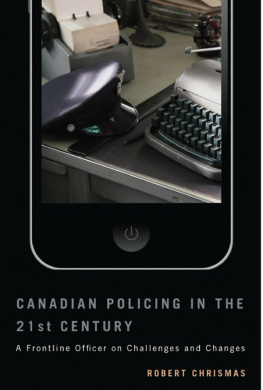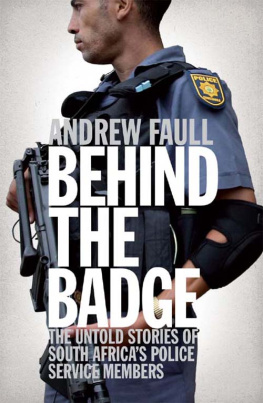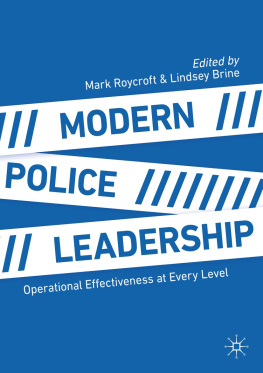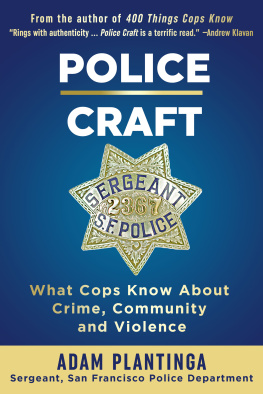McGill-Queens University Press 2013
ISBN 978-0-7735-4274-7 (cloth)
ISBN 978-0-7735-8935-3 (ePDF)
ISBN 978-0-7735-8936-0 (ePUB)
Legal deposit third quarter 2013
Bibliothque nationale du Qubec
McGill-Queens University Press acknowledges the support of the Canada Council for the Arts for our publishing program. We also acknowledge the financial support of the Government of Canada through the Canada Book Fund for our publishing activities.
Library and Archives Canada Cataloguing in Publication
Chrismas, Robert, 1962, author
Canadian policing in the 21st century: a frontline officer on challenges
and changes/Robert Chrismas.
Includes bibliographical references and index.
Issued in print and electronic formats.
ISBN 978-0-7735-4274-7 (bound). ISBN 978-0-7735-8935-3 (ePDF).
ISBN 978-0-7735-8936-0 (ePUB)
1. Police Canada. 2. Law enforcement Canada. I. Title.
HV8157. C47 2013 363.20971 C2013-902562-6
C2013-902563-4
This book was typeset by Interscript.
This book is a testament to police officers everywhere,in recognition of their dedication to protecting the vulnerableand keeping communities safe in increasingly challenging times.The weapons and battleground have changed over the pasttwo decades, but the values they fight for remain the same.
Preface
In reflecting on my twenty-eight years of law enforcement, I realizedthat many of the stories from the pre-information age eras are fastdisappearing. The policing profession has evolved in ways that werenot imagined twenty years ago. Personal computers, smartphones,and social networking have become part of our new human experience. Increased access to information has transformed the publicrelationship with government agencies, including the police, and haschanged the nature of accountability. Globalization and the complexity of todays social problems have created the need for morecollaborative, multi-disciplinary approaches. Gender, race, and agediversity have also changed policing dramatically.
This book describes a frontline officers perspective on how policing has evolved over the past two decades. It offers first-hand experiences and observations supported and complemented by a widerange of academic and professional sources. While it is not an accountof all aspects of policing, this book describes two decades of unprecedented change. The views expressed in this book are my own anddo not represent those of the Winnipeg Police Service.
Acknowledgments
Thanks go to my friends and colleagues Amanda Kerr Adam,Kimberly Carswell, Gabrielle Giroday, Shelley Hart, Gelareh Manghebati, Kevin Martell, Adrian May, Laura Normand, Christina VonSchindler, Ray Yuen, Melanie Zurba, and others for their generousdonations of time and effort to edit and provide feedback on thiswork. Thank you to the anonymous experts who read earlier versions,providing insightful critiques and challenging me to improve themanuscript. I wish to extend a special thank-you to my editors, JoanHarcourt, Mark Abley, and Joan McGilvray, indexer Celia Braves,and the entire team at McGill-Queens University Press for theirinsights, encouragement, and assistance in moving this book fromdraft to print. Any oversights are strictly mine.
Appreciation and love also go to my wife, Barb, and my children,Crystal, Chelsea, Brandi, and Bobby, for their patience and supportduring my graduate studies and the writing of this book, and forsupporting my policing career and all that has come with it.
Abbreviations
AJI | Aboriginal Justice Inquiry |
ASP | Brand name of a telescoping baton |
CACP | Canadian Association of Chiefs of Police |
CBA | Collective Bargaining Agreement |
CBRNE | Chemical, Biological, Radiological, Nuclear, Explosive |
CPA | Canadian Police Association |
CPIC | Canadian Police Information Centre |
CSIS | Canadian Security Intelligence Service |
DNA | Deoxyribonucleic acid |
ECD | Electrical Control Device |
FASD | Fetal Alcohol Spectrum Disorder |
FBI | Federal Bureau of Investigation |
ICE | Integrated Child Exploitation |
IPAC | Institute of Public Administration Canada |
IPOC | Integrated Proceeds of Crime |
ITO | Information to Obtain |
JEPP | Joint Emergency Preparedness Program |
LERA | Law Enforcement Review Agency |
MDT | Mobile Data Terminal |
MLAT | Mutual Legal Assistance Treaty |
MPS | Metropolitan Police Service (London, England) |
NGO | Nongovernment Organization |
NML | National Microbiology Lab |
NWMP | North West Mounted Police |
NYPD | New York City Police Department |
OC | Oleoresin Capsicum |
OPP | Ontario Provincial Police |
P3 | Public Private Partnerships |
PTSD | Post Traumatic Stress Disorder |
RCMP | Royal Canadian Mounted Police |
SQ | Sret du Qubec |
TRC | Truth and Reconciliation Commission |
UCN | University College of the North |
WPA | Winnipeg Police Association |
WPS | Winnipeg Police Service |
Introduction
Have technological advances and increased access to informationhelped government agencies like the police or have they overwhelmed them? The benefits and impacts of new technology aredebatable, but the dramatic changes it has created cannot be overstated. In recent decades police agencies have changed in almostevery aspect, from demographic composition to enforcement andprevention strategies to the roles they fulfill in society and the challenges they face. This book grew from my reflections on how policing has changed over the past twenty-five years of my career. In 1989my recruit class in the Winnipeg Police Service (WPS) learned towrite reports on manual typewriters, using little-remembered equipment such as carbon paper and white-out. Today, police officerscannot function without advanced skills in the use of sophisticatedcomputers and communication devices. We now take for grantedtechnologies that we could not have imagined twenty years ago.
In 2009, while on vacation in Florida, I used a smartphone toanswer phone calls and e-mails from people in partner agencies whowere assisting me on an important major investigation that I wasoverseeing. An issue that in the past would have had to wait untilI returned from vacation was addressed without missing a beat. In2012 my teenage children talk, Tweet, Facebook, and Skype in realtime with people from all corners of the globe through Internet connections and video cameras built into their cell phones. Recently oneof my daughters, who had misplaced her cell phone, used the computer in our kitchen and a global-positioning application to track itto a point in the opposite end of the city, where she had forgottenit in her boyfriends truck. In somewhat the same way, smartphonesnow provide people with the tools to track other peoples movements. Imagine this technology in the wrong hands. Some businessesare now operating without offices, with employees in opposite corners of the country or around the world meeting and operating asavatars in virtual office environments. Such changes affect interpersonal dynamics and relationships in fundamental ways. The technology that the police have to work with has advanced beyond ourwildest imagining and yet organized criminals often still have theadvantage, operating without the constraints that law enforcementagencies face, such as jurisdictional boundaries, laws, bureaucracy,and operational costs.








